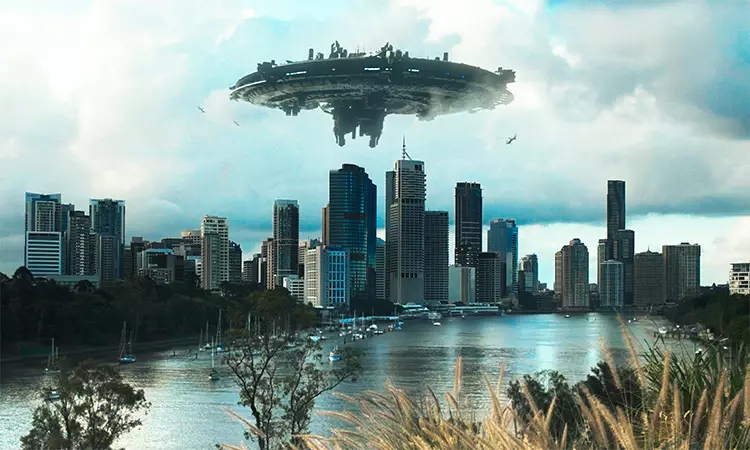In a world increasingly marked by uncertainty, Brian Hanson’s film *The Bunker* emerges as a gripping exploration of human resilience in the face of extraterrestrial threat and personal alienation. As massive alien ships loom ominously over major urban landscapes, the narrative thrusts viewers into a subterranean conflict where five scientists and a military commander are confined in a bunker, underscoring themes of isolation and madness. In this unique examination of human psychology juxtaposed against an alien invasion motif, the film crafts an unsettling atmosphere that resonates deeply with contemporary realities, particularly the experience of disconnection heightened during the COVID-19 pandemic.
At the heart of *The Bunker* is microbiologist Dr. Michele Riley, played compellingly by Chelsea Edmundson. A representation of both vulnerability and strength, Michele battles against mental encroachment while physically isolated from the world above. Her experiences reflect a broader existential crisis. The film portrays how the psychological ramifications of isolation can exacerbate feelings of guilt and anxiety, especially when loved ones are unreachable in troubling times. Michele’s descent into paranoia is vividly illustrated through her hallucinations and the blurring of lines between reality and her psyche, which is marked by visions of blood and conversations with imagined figures from her past.
This complex characterization serves to highlight the fragility of the human mind when confronted with overwhelming pressure. The dual figures of male authority surrounding Michele add layers to her struggles. Major Frank Lawrence and Mr. Riley, both represented by noted horror icons Tony Todd and Tobin Bell, respectively, become embodiments of patriarchal anxiety that impose further pressure on Michele. This dynamic speaks volumes about the internal conflicts faced by women in predominantly male environments, which, in Michele’s case, leads to a disintegration of her mental stability.
*The Bunker* deftly mirrors the universal experience of alienation, especially pertinent to contemporary audiences who may relate to its themes of isolation experienced during lockdowns and social distancing. The stark confines of the bunker serve as a metaphor for the emotional prisons individuals can construct for themselves. Paranoia and mistrust permeate Michele’s interactions with her colleagues, who alternately undermine her authority or objectify her. The tension within the group grows as Michele is left grappling with her identity and agency, increasingly isolated in her interpretation of events compared to the dismissive attitudes of her male counterparts.
Moreover, the film raises philosophical questions: Are the manifestations of Michele’s madness truly products of her isolation, or are they the result of external influences, specifically the alien presence? This ambiguity enriches the narrative, compelling audiences to reflect on their perceptions of reality. It challenges cultural narratives around mental health, gender, and power while simultaneously immersing viewers in a pulsating tension that keeps them engaged.
Michele’s journey can be interpreted as feminist allegory—a criticism against the ingrained patriarchal structures that not only silence women’s voices but may also exploit their vulnerabilities. The film suggests that Michele’s ultimate path toward self-discovery is fraught with obstacles, yet it is essential for her survival against both societal pressures and extraterrestrial threats. Her evolution from a pawn in a male-dominated scientific landscape to a fiercely independent individual reflects a broader message of empowerment.
As Michele begins to assert her own conclusions and challenge the dominant narratives set forth by her oppressive environment, she embodies the notion that resilience can arise from recognizing one’s self-worth. This theme is intensely resonant with modern audiences, inviting them to contemplate their journeys in realizing their own identities amid societal pressures.
Through a lens that blends science fiction with psychological horror, *The Bunker* speaks to the shared human condition marked by fear, isolation, and the quest for autonomy. Brian Hanson’s screenplay not only presents a thrilling narrative but also encourages introspection about resilience against overpowering external forces. By fusing a compelling story with profound social commentary, *The Bunker* stands as a testament to the enduring spirit of humanity, challenging viewers to traverse their own psychological “bunkers” in search of truth and agency. As audiences navigate this chilling yet thought-provoking narrative, they are left to ponder fundamental questions about identity, power, and the alienation that can occur both externally and within oneself.

